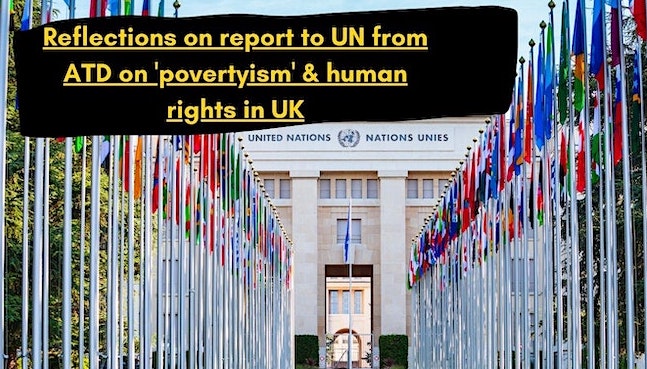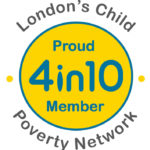Reflecting on ATD’s report to the UN on ‘povertyism’ and human rights in the UK

“One of the things that really comes across about our risk-averse child protection system is that we could go on about trauma, we could go on about fear, we could go on about the pain, we could go on about every aspect; but what really hits home is how, in our bid to help, we are catastrophically breaching people’s human rights.”
– Taliah Drayak, parent activist with lived experience of poverty.
On the 20th of April 2023, 4in10 London’s Child Poverty Network co-hosted a webinar with ATD entitled ‘Reflections on report to the United Nations from ATD on ‘povertyism’ and human rights in the UK’. The speakers — six activists with lived experience of poverty and six academics — were the experts who helped prepare three submissions made to the UN Committee on Economic, Social and Cultural Rights by ATD and Human Rights Local. These submissions presented the transformations needed across the UK for a better social care system. 
Opening the discussion was Dr Koldo Casla from the University of Essex who gave an overview of this project and explained that poverty is a human rights issue. Afterwards, speakers conversed in pairs about the extensive research carried out to gather evidence for the submission. In each pair, one lived experience activist and one academic exchanged insights. Additionally, the pairs drew from experience to share wider perceptions about the faults of the system whilst offering conceptualisation of methods for a humane practice.
ATD’s Youth Voices project was a focal point of conversation during the webinar as 18-year-old Kaydence Drayak spoke to Dr Gill Main about her experience of being a peer researcher. Kaydence explained:
Many young people that go through the child protection system and interact with social services have their trust broken. Whether this means that they just don’t trust social workers or professionals, or even just adults in general, it will make it that much more difficult when you’re trying to do research with them because they won’t trust you. They don’t know who you are, but they are more likely to trust someone they know has experienced similar life events, somebody who might get it, somebody who is less likely to misunderstand or to try and intervene in a way that can be harmful.
Another prime focus of the webinar was ‘povertyism’ a term first coined by ATD Fourth World in 2008 as seen here and more recently introduced at the United Nations by Olivier de Schutter.
Watch the full webinar below:

